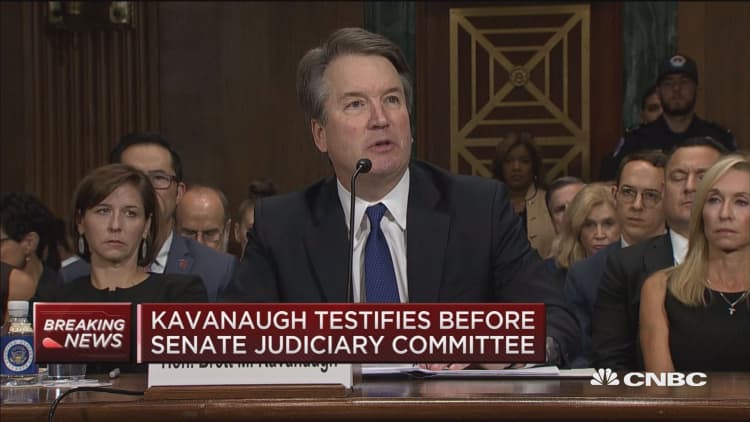Democratic lawmakers introduced a bill Thursday that would require "dark money" judicial groups to reveal their donors after playing an outside role during a recent run of Supreme Court confirmation hearings.
Sens. Dianne Feinstein and Sheldon Whitehouse, both members of the Senate Judiciary Committee, filed the bill titled the "Judicial Ads Act."
The bill, co-sponsored by eight other Democratic lawmakers, demands that groups which spend $50,000 in a calendar year on advertisements linked to federal judicial nominations to release the names of their donors who give over $5,000. These organizations have always kept their donors anonymous.
It would also require advertisements connected to judicial confirmations to disclose who is funding the spot and would ban foreign nationals from funding advertisements related to a judicial nomination.
The bill comes after Senate Democrats published a report claiming President Donald Trump's outside judicial advisor, Leonard Leo, and his vast network have helped rig the process through which the president has pushed through a large number of judicial appointments.
Leo responded to those claims in a text message to CNBC, suggesting that they should be more focused on responding to the coronavirus pandemic.
The Trump administration has nominated and confirmed at least 200 judges, including two Supreme Court justices, Brett Kavanaugh and Neil Gorsuch.
Throughout both of the Supreme Court hearings, "dark money" groups, such as the conservative Judicial Crisis Network and the more progressive Demand Justice, unleashed ad campaigns arguing either for or against Trump's nominees.
Those attempts to influence confirmation processes led to the crafting of the "Judicial Ads Act," Feinstein said in a statement. Democrats are the minority party in the Senate. So far no Republicans have signed on to help sponsor the bill.
"The American people have a right to know who is trying to influence judicial nominations," Feinstein said. "Our bill would help shine light on the process, requiring major donors to these campaigns to be identified and removing the serious potential for undisclosed conflicts of interests."
Whitehouse said the outside effort by these groups comes down to corporate interests.
"A decades-long effort by big corporations and partisan donors to rig the courts using dark money is working; they've won over 80 partisan, 5-4 decisions," Whitehouse said in a statement.
The bill is back by the Campaign Legal Center, Citizens for Responsibility and Ethics in Washington, the Project on Government Oversight, Public Citizen, Democracy 21 and End Citizens United.



